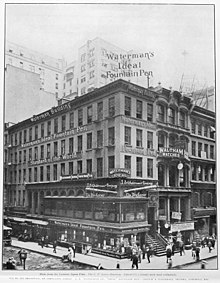Waterman Pen Company: Difference between revisions
No edit summary |
m Using vector logo |
||
| Line 3: | Line 3: | ||
{{Infobox company |
{{Infobox company |
||
| name = Waterman S.A. |
| name = Waterman S.A. |
||
| logo = [[Image:Waterman logo. |
| logo = [[Image:Waterman logo.svg|250px]] |
||
| caption = |
| caption = |
||
| type = [[Subsidiary]] |
| type = [[Subsidiary]] |
||
Revision as of 11:51, 29 August 2016
This article needs additional citations for verification. (May 2013) |
 | |
| Company type | Subsidiary |
|---|---|
| Industry | Luxury goods |
| Founded | New York, U.S., 1884 |
| Founder | Lewis Waterman |
| Headquarters | |
Area served | Worldwide |
| Products | Fountain pens |
| Owner | Newell Brands |
| Parent | Sanford L.P. |
| Website | www.waterman.com |

The Waterman pen company is a major manufacturer of luxury fountain pens. Established in 1884 in New York City by Lewis Edson Waterman,[1] it is one of the few remaining first-generation fountain pen companies, as Waterman S.A..
Since 2000 it has been owned by the American group Newell Brands subsidiary Sanford L.P.
History
The initial years of Waterman's involvement in pen manufacturing are unclear. The earliest records of reservoir pens date back to the tenth century, with the oldest surviving examples dating back to the 18th. Waterman's improvements on basic pen design and aggressive marketing played a vital role in making the fountain pen a mass-market object.
In 1883 Lewis Edson Waterman invented the "Three Fissure Feed" system which prevented excessive discharge of ink after previously losing a big sale due to a leaking fountain pen, which led to the key novelty feature of Waterman's first fountain pens was the feed, for which his first pen-related patent was granted in 1884.[2] From the beginning competition in the fountain pen industry was fierce, both in the marketplace and the courtroom. Despite later company literature that depicts Lewis E. Waterman as a golden-hearted innocent, all evidence indicates that he was a tough, savvy, and innovative businessman.
In 1899 the L.E.Waterman company developed the "spoon Feed" system which prevented overflow of ink, which also led to the company receiving the gold medal of excellence at the "Exposition Universelle" in Paris in 1900.

Nonetheless, it was after L. E. Waterman's death in 1901 that the company took off. Under the leadership of Waterman's nephew, Frank D. Waterman, the Waterman Pen Company expanded aggressively worldwide. While Waterman introduced its share of innovations, the company's main selling point was always quality and reliability.
In 1904 the pen clip was invented to allow a pen to be held in the pocket or "clipped" onto an object. The same year also saw the development of the first complete inkflow-proof retractable pen.
As the 20th century wore on Waterman's conservatism allowed its younger and more innovative competitors to gain market share—Parker, Sheaffer, and Wahl-Eversharp, in particular. By the later 1920s, Waterman was playing catch-up; it continued to struggle through and beyond World War II before finally shutting down in 1954.
Waterman's French subsidiary, Waterman Jif (later Waterman S.A.), continued to prosper and eventually absorbed what remained of the American company and its British arm.
The Waterman company was acquired by the Bic company which went public in 1958 with a reverse merger; Bic would later sell off the Waterman division.[3]
Successfully weathering the challenge of the ballpoint pen, it was acquired by The Gillette Company in March 1987 which grew overall sales by 40% with its aggressive North American sales [4] and later sold to Sanford, a division of Newell Rubbermaid, along with the Parker Pen Division, which Gillette acquired in 1993.
In 2011, the Parker factory at Newhaven, East Sussex, England was closed, and its production transferred to Saint-Herblain, France.
Pens
Early Waterman pens were made of hard rubber and were equipped with 14K gold nibs. From early on, precious metal trim and overlays were offered. Many are still in use today, and their nibs are prized for their smoothness and flexibility.
Waterman's high production volume from c. 1900 on means that vintage examples are comparatively easy to find today. The most common models from the hard rubber era are the #12 slip-cap eyedropper, the #52 screw-cap lever-filler, and the #42 retracting-nib safety pen. Though largely ignored by present-day collectors, the Waterman C/F of 1953 introduced the modern plastic ink cartridge.
In 1983 and celebrating the company's 100th anniversary Waterman created the Le Man 100, aiming its products at the luxury writing market. Former French President François Mitterrand was known for carrying two wherever he went. Other designs that went on to be a landmark in luxury writing were the Lady Elsa and Lady Patricia contemporary writing pens.
As Waterman progressed into the modern era, it produced a lot of the pens that are still around today including the Edson, the Exception, the Philéas, the Hémisphère, the Expert, the Harmonie, the Charleston, the Ici et Là, the Audace, the Sérénité, the Liaison and the Carène.
In 2009 we saw the latest development in the Waterman luxury pen range with the introduction of the Waterman Elegance, crossing the divide between writing and stylish jewelry.
See also
References
- ^ "pen", Encyclopaedia Britannica 15th Edition (1998)
- ^ U.S. patent 293,545 Fountain Pen, February 12, 1884
- ^ Friday, Mar. 17, 1967 (1967-03-17). "Corporations: Mightier than the Pencil". TIME. Retrieved 2011-08-17.
{{cite web}}: CS1 maint: multiple names: authors list (link) CS1 maint: numeric names: authors list (link) - ^ http://www.nytimes.com/1988/12/16/business/waterman-rift-a-tearful-farewell.html
